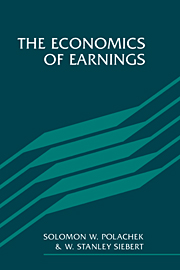Book contents
- Frontmatter
- Contents
- Foreword
- Preface
- 1 Introduction: the importance of life-cycle analysis
- 2 The life-cycle human capital model
- 3 Schooling
- 4 Post-school investment
- 5 Labour supply
- 6 Gender in the labour market
- 7 Compensating wage differentials and heterogeneous human capital
- 8 Information and wages
- 9 Payment systems and internal labour markets
- 10 Unionisation
- References
- Subject index
- Author index
Preface
Published online by Cambridge University Press: 18 September 2009
- Frontmatter
- Contents
- Foreword
- Preface
- 1 Introduction: the importance of life-cycle analysis
- 2 The life-cycle human capital model
- 3 Schooling
- 4 Post-school investment
- 5 Labour supply
- 6 Gender in the labour market
- 7 Compensating wage differentials and heterogeneous human capital
- 8 Information and wages
- 9 Payment systems and internal labour markets
- 10 Unionisation
- References
- Subject index
- Author index
Summary
The study of the wages that people earn, the jobs that they do, and the labour market laws and rules within which they operate – the field of labour economics – has developed considerably over the last few decades. A major innovation has been the move from an institutional approach to an analytical setting. Two developments are noteworthy. The first is elaboration of the theory of rational choice. The focus has been changing from point-in-time one-period choice, to choice over the life cycle. People are now assumed to have the information and ability to optimise over a long-term planning horizon – this is the human capital revolution. Secondly the advent of large-scale microeconomic datasets, and the computer power to process these data, has enabled more satisfactory testing and exploration of the new theories.
At the same time government has become more powerful over the years, and government labour market intervention consequently more far reaching, and possibly more invasive. Much government policy is directed towards labour market issues, including education subsidies, training programmes, gender and race equality programmes, unemployment insurance laws, minimum wage laws, union protection laws, health and safety laws, and laws limiting the ability of firms to dismiss workers (‘employment protection’).
- Type
- Chapter
- Information
- The Economics of Earnings , pp. xv - xviPublisher: Cambridge University PressPrint publication year: 1993



